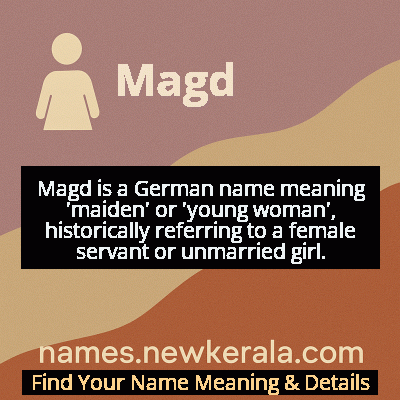Magd Name Meaning & Details
Origin, Popularity, Numerology Analysis & Name Meaning of Magd
Discover the origin, meaning, and cultural significance of the name MAGD. Delve into its historical roots and explore the lasting impact it has had on communities and traditions.
Name
Magd
Gender
Female
Origin
German
Lucky Number
7
Meaning of the Name - Magd
Magd is a German name meaning 'maiden' or 'young woman', historically referring to a female servant or unmarried girl.
Magd - Complete Numerology Analysis
Your Numerology Number
Based on Pythagorean Numerology System
Ruling Planet
Neptune (Ketu)
Positive Nature
Intuitive, analytical, spiritual, and inquisitive.
Negative Traits
Secretive, reserved, aloof, and can be overly critical.
Lucky Colours
Green, yellow.
Lucky Days
Monday.
Lucky Stones
Cat’s eye, moonstone.
Harmony Numbers
1, 5, 6.
Best Suited Professions
Scientists, researchers, spiritual leaders, detectives.
What People Like About You
Depth of knowledge, analytical skills, spirituality.
Famous People Named Magd
Magd Hain
German painter
Known for her expressive landscape paintings and contributions to German modern art
Magd Bernhard
Austrian writer
Authored several novels exploring rural Austrian life and women's experiences
Magd Fischer
German educator
Pioneered progressive education methods in post-war Germany
Name Variations & International Equivalents
Click on blue names to explore their detailed meanings. Gray names with will be available soon.
Cultural & Historical Significance
In regional German folklore, names derived from Magdalena often appeared in folk tales and local traditions, particularly in Bavaria and Austria where the name maintained strong cultural ties. The name Magd specifically gained prominence during the 18th and 19th centuries as German naming conventions shifted toward more familiar, shortened forms of traditional names. This period saw the emergence of Magd as both a given name and a term of endearment within families, reflecting the intimate, personal nature of the name in German domestic life. The cultural legacy of Magd persists in family naming traditions, where it continues to be passed down through generations as a connection to German heritage and religious history.
Extended Personality Analysis
Individuals named Magd are often perceived as possessing a unique blend of traditional values and inner strength. They typically exhibit qualities of loyalty, devotion, and deep emotional intelligence, making them excellent friends and confidantes. Their connection to the name's meaning of 'maiden' often manifests as a sense of purity in intentions and a straightforward, honest approach to relationships. Magds are frequently described as having strong intuitive abilities and a nurturing nature, often taking on caretaking roles within their families and social circles. They tend to be deeply principled individuals who value authenticity and meaningful connections over superficial interactions.
Beyond their nurturing qualities, those named Magd often demonstrate remarkable resilience and quiet determination. While they may not seek the spotlight, they possess an inner fortitude that enables them to overcome significant challenges. Their strength is typically expressed through consistent, steady action rather than dramatic gestures. Many Magds develop strong artistic or creative talents, particularly in fields that allow them to express deep emotion or spiritual themes. They often have a natural affinity for tradition and history, valuing connections to the past while thoughtfully navigating modern life. Their combination of emotional depth, reliability, and quiet strength makes them valued members of their communities, often serving as the emotional anchor for those around them.
Modern Usage & Popularity
In contemporary German-speaking societies, Magd has transitioned from a common given name to a more distinctive, traditional choice. While its usage has declined significantly since the early 20th century, it maintains a presence in specific contexts. Modern parents who choose the name often do so to honor family traditions, particularly in rural areas of Bavaria, Austria, and Switzerland where Catholic naming customs remain influential. The name appears most frequently in families with strong regional identities or those seeking to preserve German cultural heritage. According to recent German naming statistics, Magd ranks well outside the top 1000 baby names, making it quite rare in urban centers but maintaining modest usage in traditional communities. Interestingly, the name has seen a slight resurgence among parents seeking vintage names with historical significance, though it remains far less popular than its variations like Magda or Magdalena. The name's current usage reflects a broader trend of reviving traditional German names while also representing a conscious choice toward distinctive, meaningful naming rather than following popular trends.
Symbolic & Spiritual Meanings
The name Magd carries rich symbolic meanings that extend beyond its literal translation of 'maiden.' It represents the archetype of spiritual transformation and redemption, drawing from Mary Magdalene's journey from marginalization to becoming a central figure in Christian tradition. Symbolically, Magd embodies the concept of finding one's true purpose through adversity and the idea that profound change is always possible. The name also symbolizes the bridge between earthly existence and spiritual awakening, representing individuals who navigate both practical reality and higher consciousness. In German cultural symbolism, Magd evokes images of steadfast loyalty, quiet perseverance, and the enduring strength found in feminine principles. It represents the power of devotion—whether to people, principles, or spiritual beliefs—and the idea that true influence often comes through consistent, gentle presence rather than forceful action. The name's symbolic resonance makes it particularly meaningful for those who value depth of character, spiritual growth, and the transformative power of love and faith in human experience.

